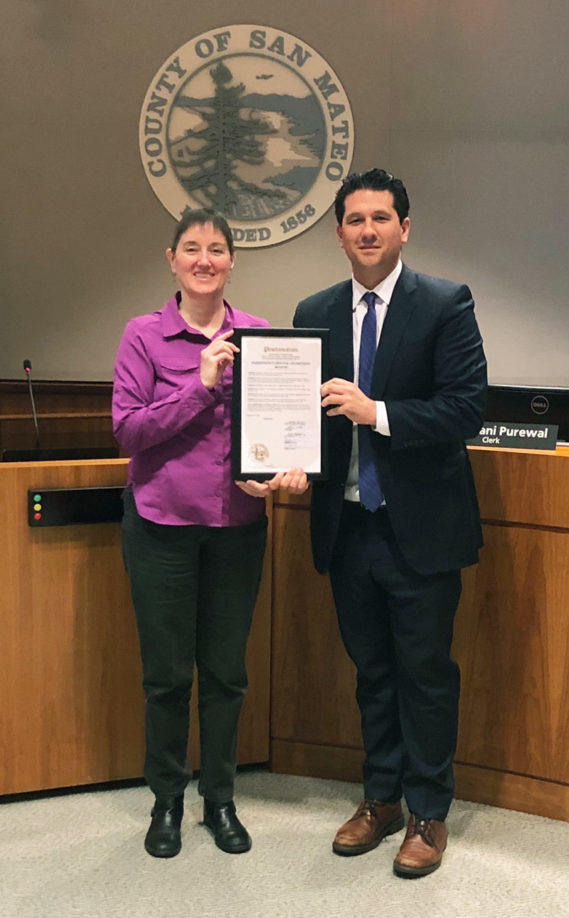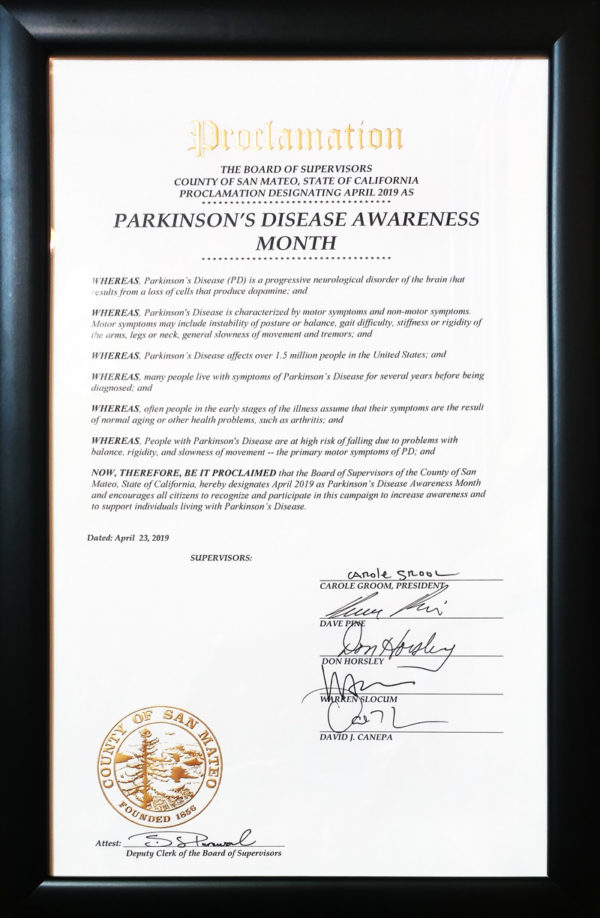

Today, the San Mateo County Board of Supervisors declared April to be Parkinson’s Awareness Month. In April alone, nearly 5,000 people in the US will learn they have Parkinson’s. Robin Riddle with the American Parkinson Disease Association (APDA) Information & Referral Center at Stanford accepted the proclamation and spoke about the challenges of Parkinson’s Disease.
Here are Ms. Riddle’s remarks:
On behalf of the American Parkinson Disease Association (APDA) Information & Referral Center at Stanford, I am pleased to accept the San Mateo County proclamation that April is Parkinson’s Awareness Month.
The APDA center at Stanford provides essential Parkinson’s support, education, and services to county residents and all Bay Area residents year round.
Of course, April is a time of enhanced focus on Parkinson’s Disease. This is a time when others pay closer attention and it’s a great opportunity to educate the larger community about PD.
Every nine minutes in the US, there is a new diagnosis of PD. This means that in April alone, nearly 5,000 people will learn they have Parkinson’s. There are an estimated 1 million Americans living with PD. It is the second most common neurodegenerative disorder; Alzheimer’s is the most common with 5 million Americans having that diagnosis. Most develop PD after the age of 50 but about 10% of PD cases affect those younger than 50.

Parkinson’s is a progressive movement disorder, meaning that the motor symptoms become worse over time. The most common motor symptoms are tremor, stiffness or rigidity of muscles, slowness of movement, and gait instability. Gait instability means that the person is at a higher risk of falls than the rest of us. Fall prevention is key. Unfortunately, there are lots of non-motor symptoms, such as sleep dysfunction, constipation, anxiety, depression, and fatigue. Indeed, constipation can pre-date PD motor symptoms by 20 years. These non-motor symptoms — which are unseen by others — can greatly affect quality of life.
The information and referral center at Stanford is one of 22 centers across the US. We offer a local support group for anyone in the community to hear lectures by movement disorder specialists, physical therapists, speech therapists, psychologists, and psychiatrists about different aspects of PD. We used to meet at the Little House Senior Center in Menlo Park, and recently moved to Avenidas Senior Center in Palo Alto. And we just started a support group at Stanford’s Neuroscience Center for those interested in deep brain stimulation as a treatment for PD. We also offer five Parkinson’s caregiver-only support groups that meet in Daly City, Belmont, Menlo Park, and Los Altos, helping caregivers cope with the challenges of Parkinson’s. As a caregiver to someone with an atypical parkinsonism condition, I can tell you that caregiver support is critical.
The APDA’s website (apdaparkinson.org) offers free publications in both English and Spanish. And the organization offers webinars presented by experts in the field. Stanford’s website (parkinsons.stanford.edu) offers a blog of Parkinson’s-related community events in the county and Northern California. And we’ve started offering webinars featuring Stanford physicians on topics such as blood pressure problems and treatment of advanced Parkinson’s.
The goals of the Stanford information and referral center and the APDA are to enable those with Parkinson’s to live life to the fullest, and to help their family members, friends, and caregivers find the spirit and determination to persevere.